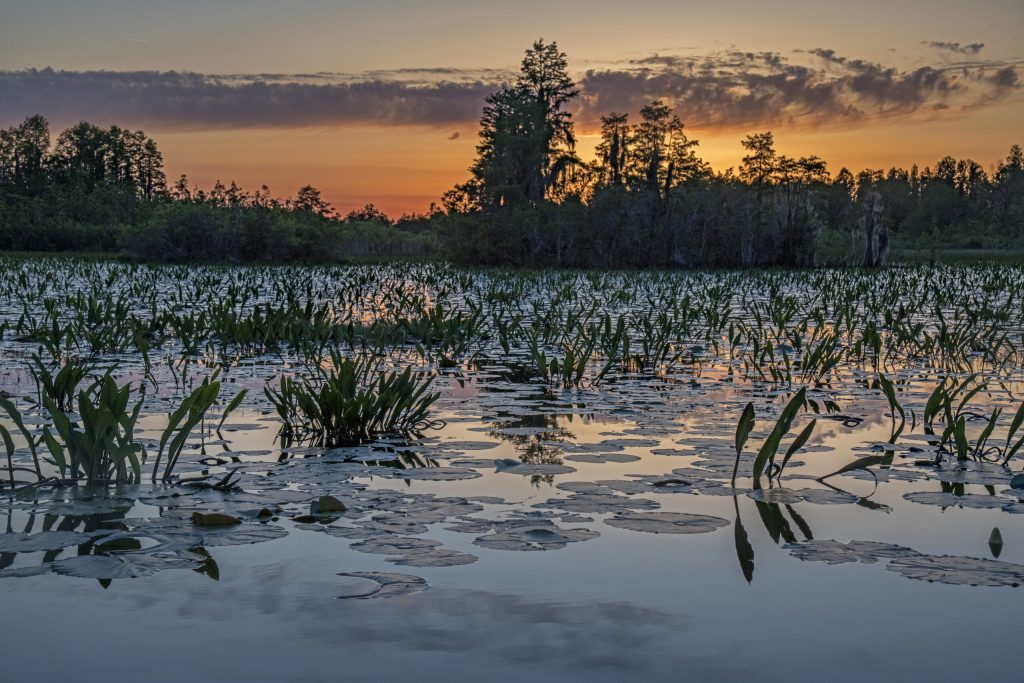Latest bill targeting strip mining near Okefenokee receives mixed reaction from environmentalists

An Alabama-based company first announced in 2019 that it intended to mine for titanium, staurolite, and zircon near the Okefenokee National Wildlife Refuge. Getty Images
A south Georgia lawmaker whose district borders the Okefenokee National Wildlife Refuge has filed a new bill calling for a three-year moratorium on new surfacing mining permits in areas of Georgia that today sit untouched.
The bill, sponsored by Lake Park Republican Rep. John Corbett, would block state regulators from accepting any new permit applications for dragline mining for heavy mineral sands in areas where permits have not been previously issued.
The proposal would not stop an Alabama-based company, Twin Pines Minerals, from moving forward with a 582-acre demonstration proposal planned for Trail Ridge near the refuge. The state Environmental Protection Division issued draft permits for the company earlier this month, kicking off a new public comment period.
If passed, HB 1338 would prevent Twin Pines from expanding the footprint of the initial pilot project in the next three years, although Corbett acknowledged that is likely too tight a window to be a factor for Twin Pines. The company would have to apply for another permit to expand, starting another multiyear process.
The main benefit of the new bill, Corbett said, is the data that would be collected should the Twin Pines project move forward.
“If they get a permit, it will probably be tied up in court for a year or so but then should have time to get some data to prove out this type of mining going forward,” Corbett said in an interview. “So, it just gives some guardrails around this area while they get some data. That’s all we’re trying to do.”
His bill also creates new limits for the appeals phase for future mining permit applications. For example, a permit would kick in if the Office of State Administrative Hearings does not make a final decision on an appeal within about five months. Corbett said that is meant to create some “certainty.”
Corbett’s proposal emerged a little more than a week before Crossover Day, when a bill needs to clear at least one chamber to have a direct path to the governor’s desk. The bill appears to be on a fast track, with it already slated for consideration in a subcommittee Wednesday.
Another bill, sponsored by Thomasville Republican Rep. Darlene Taylor, would go further and ban any new or expanded permits at Trail Ridge, which is seen as an important barrier for the swamp. That measure has been stuck in the House Natural Resources and Environment Committee since last year.
Corbett argued his approach is better because it factors in the concerns about private property rights that dogged the other proposal.
“A lot of people thought, ‘Well, he’s pro-mining or advocating for the mine.’ My stance the whole time has been to advocate private property rights and let EPD make that determination based on the science,” he said.
A spokesman for Twin Pines said the company was evaluating the bill. The company strongly objected to the other bill.
The immediate reaction from environmental groups Tuesday was mixed.
The Georgia Conservancy issued a press release praising the bill as a new pathway toward protecting a critical landscape.
“(The bill) demonstrates that our lawmakers have heard the widespread public concerns over the proposed mining operation and its threats to the Okefenokee,” said Katherine Moore, the group’s president. “With this measure, the bill’s sponsor sought a way forward which reflected those public declarations of the Swamp’s value while focusing on a concern of several within the General Assembly, private property rights.”
But other groups blasted the proposal, arguing the bill would do more to protect Twin Pines than the Okefenokee Swamp.
“This bill is not only unprotective, it would harm efforts to protect the swamp by limiting the amount of time agencies and courts have to review the science and do their job,” said Bill Sapp, senior attorney with the Southern Environmental Law Center.
“A three-year moratorium on new mining permit applications will not slow down Twin Pines’ reckless mining plan and distracts from the troubling provisions in the rest of the bill. The Okefenokee Swamp and the people of Georgia deserve better,” he added.
Rena Ann Peck, executive director of the Georgia River Network, urged lawmakers to put Taylor’s stalled bill up for a vote.
“This in and of itself isn’t going to stop future mining unless there are catastrophic effects in the next three short years,” Peck said, referring to Corbett’s bill. “We’d like to see Trail Ridge protected now and forever with the Okefenokee Protection Act.”
The mining project’s supporters argue the project would bring jobs to an area that needs them.
Opponents counter that the ridge plays a vital role in maintaining the swamp’s water levels and, therefore, supporting the refuge’s famously diverse ecosystem. They also argue that hurting the swamp would jeopardize the tourism industry that fuels the local economy. And that tourism could be supercharged if the refuge is named a UNESCO World Heritage Site, as was formally proposed last year.
Corbett has another bill that would increase fines for mining permit holders who provide false information on an application or report, increasing the maximum penalty from $1,000 per day to $10,000. That bill cleared the House last year and was voted out of a Senate committee last week.
SUPPORT NEWS YOU TRUST.
The post Latest bill targeting strip mining near Okefenokee receives mixed reaction from environmentalists appeared first on Georgia Recorder.


